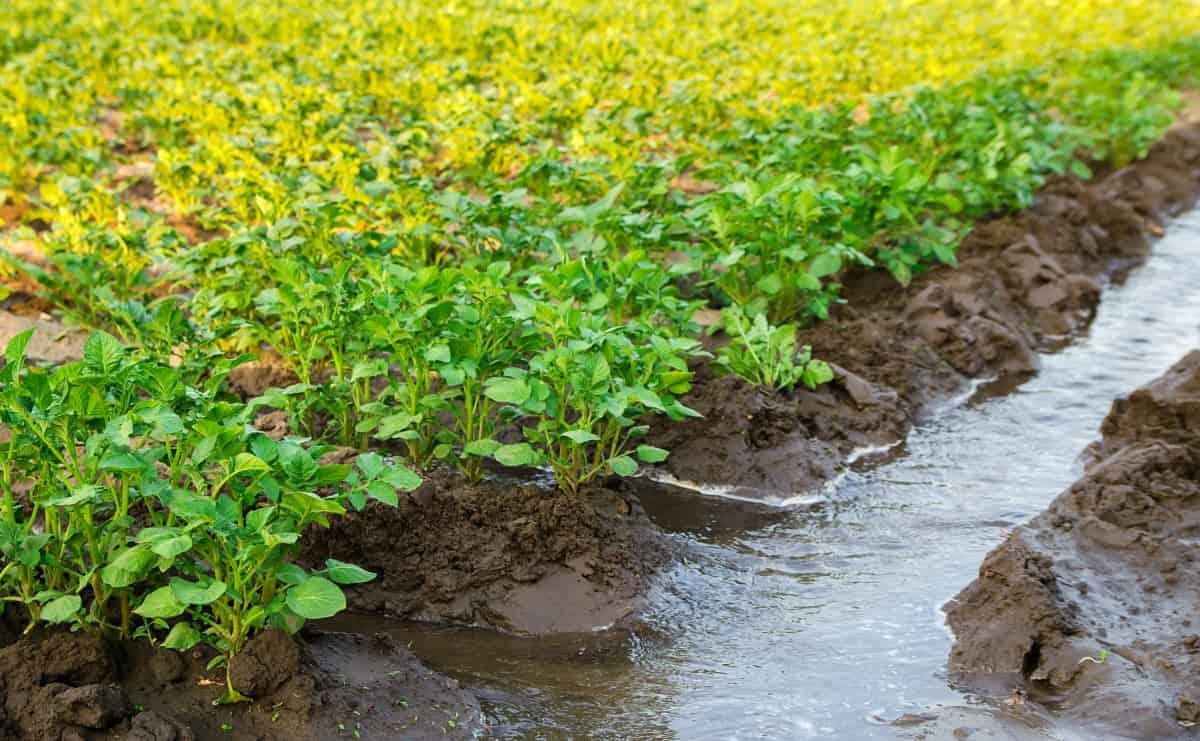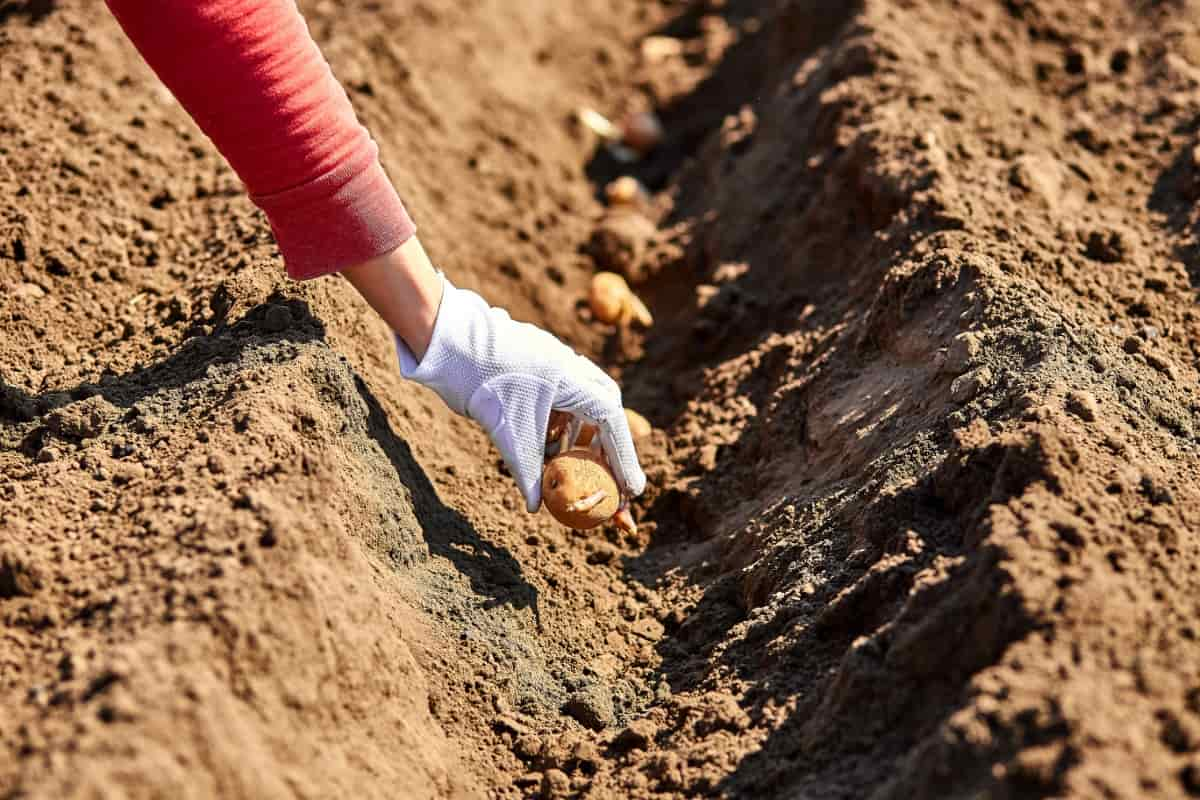The success of any agricultural enterprise rests on an intricate interplay of several factors. Among these, soil composition often takes the spotlight due to its pivotal role in fostering plant growth and productivity. Successful potato cultivation depends largely on soil composition. These tuberous crops require specific soil conditions to thrive.

Consequently, understanding and harnessing the best soil composition becomes crucial for growers aiming for high yields and quality produce. In this comprehensive article, we explore the key aspects of soil composition for successful potato cultivation, highlighting the importance of organic soil and how to create and maintain optimal conditions for potato growth.
Soil Composition for Potato Cultivation
Understanding the Role of Soil Composition in Successful Potato Cultivation
The importance of soil composition in potato cultivation cannot be overstated. Soil serves as an inherent medium conducive to the cultivation of plants, furnishing indispensable elements such as vital nutrients, water, and oxygen to facilitate the development of potato plants. Additionally, it imparts structural reinforcement, guaranteeing steadfastness throughout the growth stage of these plants. Understanding the soil composition necessary for successful potato cultivation entails knowing the different soil types, their physical and chemical properties, and how these properties influence potato growth.
Potatoes thrive in well-draining, sandy, or loamy soil with a slightly acidic pH. They also prefer soil rich in organic matter, critical in improving soil structure, nutrient availability, and water retention capacity. Organic soil promotes microbial activity, which aids nutrient cycling, a key process in plant growth. Thus, incorporating organic matter into the soil can significantly enhance potato cultivation.
Embracing the Ideal Soil Composition for Potato Cultivation
The ideal soil composition for successful potato cultivation is primarily well-drained and rich in organic matter. Good drainage ensures that excess water does not stagnate around the roots, preventing conditions that would promote disease and rot. Soil composed of either sandy or loamy texture is typically good at draining while retaining enough moisture and nutrients for the plant’s needs.
A slightly acidic soil pH between 5.8 and 6.5 is optimal for potato growth. This range facilitates the availability of essential nutrients in the soil, promoting the plant’s overall health and productivity. The soil’s pH also influences the activity of soil microbes, which further contribute to nutrient cycling and availability.
Organic soil is vital in the ideal soil composition for potato cultivation. Organic matter helps enhance the soil’s physical properties, improve its water-holding capacity, and promote soil structure and porosity. These attributes aid in providing the necessary air and water to the plant roots, encouraging healthy growth.
Furthermore, organic matter enriches the soil with essential nutrients, making it a natural fertility enhancer. It feeds the soil microbes, leading to increased biological activity and improved nutrient cycling. Hence, incorporating organic matter into the soil significantly contributes to successful potato cultivation.
Strategies for Enhancing Soil Composition for Potato Cultivation
Achieving the best soil composition for successful potato cultivation often involves implementing appropriate soil management strategies. These strategies aim to improve the soil’s physical properties, adjust pH levels, and enrich the soil with organic matter. One of the common strategies involves the use of soil amendments to enhance soil structure and fertility. These amendments, primarily organic in nature, include compost, aged manure, green manure, cover crops, and organic mulch.
In case you missed it: Unlocking the Power of Potato Companion Planting for Increased Yields

They are incorporated into the soil to increase its organic matter content, improving its physical properties and nutrient availability. Maintaining a slightly acidic soil pH is crucial for successful potato cultivation. Soil pH can be adjusted by applying specific amendments. Lime is a frequently employed substance for the purpose of increasing the pH levels of excessively acidic soils, whereas elemental sulfur or aluminum sulfate can effectively decrease the pH levels of overly alkaline soils.
Crop rotation is another effective strategy that helps maintain soil fertility and reduce disease pressure. Rotating potatoes with legume crops can improve soil nitrogen content since legumes can fix atmospheric nitrogen with the help of rhizobium bacteria in their roots. Crop rotation also helps break the life cycle of soil-borne diseases and pests that specifically affect potatoes, thereby minimizing their impact on yield.
Cover cropping is another essential strategy for enhancing soil composition. Cover crops shield the soil from erosion and nutrient depletion while enhancing its organic matter through decomposition. Moreover, some cover crops can suppress weeds, reducing the need for herbicides.
Maximizing the Benefits of Organic Soil in Potato Cultivation
The integration of organic soil in potato farming significantly impacts crop yield and quality. Organic soil, rich in decomposed plant and animal material, is a powerhouse of nutrients. It stimulates beneficial microbial activity, promoting nutrient cycling and improving soil structure and fertility. Application of compost, one of the most nutrient-rich forms of organic soil, to potato fields can drastically improve soil composition.
Compost increases the soil’s organic matter content, enhances its water-holding capacity, and improves its structure, making it more friable and easier for potato tubers to grow. Moreover, compost supplies a wide range of nutrients, making it an excellent natural fertilizer. Vermiculture, or cultivating worms to create a mixture of decomposing vegetable or food waste, is another organic method to enhance soil fertility.
The resultant vermicompost is a nutrient-rich organic soil amendment that can significantly improve potato yield and quality. Biochar, a form of organic soil produced by the biomass pyrolysis, has also shown promise in potato cultivation. Biochar application has been found to increase soil carbon content, improve soil pH, enhance nutrient use efficiency, and mitigate greenhouse gas emissions.
In case you missed it: Irrigation Techniques for Potato Crops: For High Yield and Profits

Conclusion
Soil composition is crucial in successful potato cultivation. Ensuring well-drained, sandy, or loamy soil with slightly acidic pH is paramount. Additionally, enriching the soil with organic matter can enhance its physical properties, promote nutrient cycling, and improve potato yields and quality. While the journey to perfect soil composition may seem daunting, it is worthwhile for any potato grower.
Implementing sustainable practices such as organic soil amendments, maintaining appropriate pH levels, and practicing crop rotation and cover cropping can achieve the ideal soil composition. By understanding the soil’s needs and nurturing it with the right inputs and care, growers can unlock the full potential of their potato crops, paving the way for successful and sustainable potato cultivation.
- Feed Your Flock for Less: Top 10 Tips to Save on Chicken Feed
- Ultimate Guide to Ossabaw Island Hog: Breeding, Raising, Diet, and Care
- Hatching Answers: The Top 10 Reasons Your Chickens Aren’t Laying Eggs
- Eggs and Economics: Breaking Down the Cost of Raising Backyard Chickens
- Defend Your Greens: Proven Methods to Keep Iguanas Out of Your Garden
- Ultimate Guide to Cinnamon Queen Chicken: A Comprehensive Guide for Beginners
- Ultimate Guide to California Tan Chicken: Breeding, Raising, Diet, Egg-Production and Care
- Ultimate Guide to Marsh Daisy Chicken: Breeding, Raising, Diet, and Care
- 10 Types of Chicken Farming Businesses You Can Start for Profits